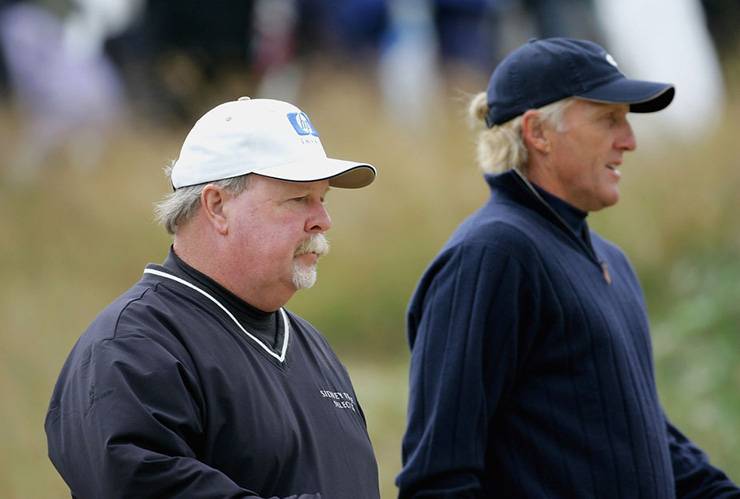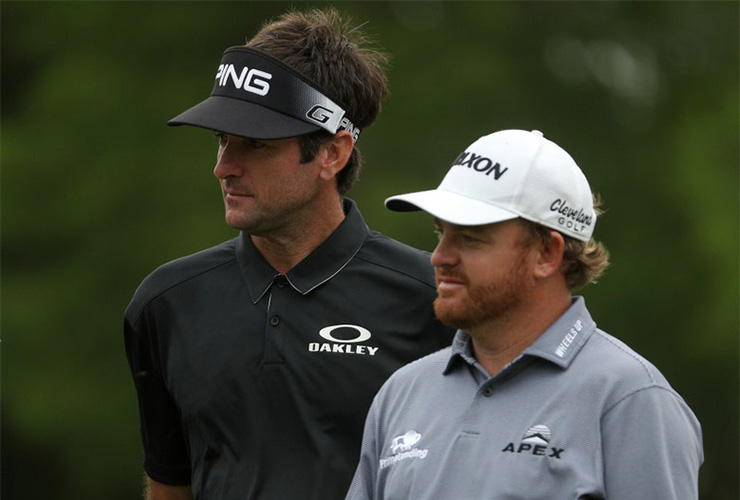Watson and Holmes, though not Dr. Watson and Sherlock Holmes (Photo by Chris Graythen/Getty Images)
By Dave Shedloski
“But these are deeds which should not pass away, and names that must not wither,” Lord Byron once wrote, and we don’t mean Byron Nelson, but, rather, the poet of the late 18th and early 19th centuries.
At Augusta National Golf Club, names certainly do not wither. Analytics might be all the rage in golf, but numbers and stats are ephemeral. Names resonate. And at the Masters Tournament, they are given homage. The Hogan, Nelson and Sarazen Bridges are famous landmarks, named for three legends – Ben Hogan, Byron Nelson and Gene Sarazen. Arnold Palmer, the first man to win four green jackets, and Jack Nicklaus, who owns a record six of them, have had plaques dedicated to them on the grounds.
Tiger Woods, that transcendent figure who won his fifth Masters title last year in a comeback that on which we get to reminisce a bit longer with the 84th Masters postponed, is likely to one day join them with his own monument of sorts – and, thus, further prove that Augusta National is not Tiger-proofed.
And, of course, other celebrated names come to mind, such as Sam Snead, Seve Ballesteros, Jimmy Demaret, Ben Crenshaw and Phil Mickelson, who are among the 17 men who have multiple green jackets.
With the addition of 17 first-time participants in last year’s 83rd Masters Tournament, the total number of players – including one Player, Gary – who have competed at Augusta National Golf Club is 1,307.
Nearly a third of those players, 469 of them, have competed just once in the tournament. More interestingly, almost half of the participants, 608, haven’t once made a cut – and that’s with the cut having not been instituted until 1957.
There have been 52 different Masters winners, and 37 of those men have unique surnames in the tournament’s annals. How many players have at least one top-25 finish in their careers? Try 548. Only 315 players have ever had a top-10 finish, with six-time winner Jack Nicklaus, unsurprisingly, having the most (22) not only as an individual but against any collection of surnames.
There have been 1,086 different surnames on the all-time contestants list. We numbered them starting with No. 1 Tommy Aaron and ending with No. 1,086 Richard Zokol. And the absolute most astounding and eerie coincidence – no, not Errie, as in Ball, who played in the inaugural Augusta National Invitation Tournament in 1934 – in this entire exercise is the name that landed on 747 before we added the 17 first-timers in 2019: Palmer. And the first of the four Palmers who competed in the Masters, is, of course, Arnie, the famed golfing aviator.
The leader in the clubhouse as the most common name in Masters history is the combined surnames of Clark and Clarke, which beat the Thompson/Thomson group 8 to 7. Close behind are Smith and Wilson, with six apiece.
But for sheer domination, the patronym “Mc” or “Mac” appears a combined 35 times starting with Bob MacDonald and ending with Harold “Jug” McSpaden. Translated, Mac or Mc means “son of.” Finish that thought at your own risk.
T.S. Eliot wrote that April is the cruelest month, but only January (Don) and May (Bob), ever were invited past the august gates of Augusta National. Daly (John) and Weekley (Boo) made appearances, too.
Holmes (J.B.) would not be complete without Watson. There have been four, including two-time Masters winners Tom and Bubba. And as for those five Lewis boys, they are complemented by the Clarks.
George Burns couldn’t hold a candle to David Frost. There was a huge difference between a Little (Lawson), who played in 19 Masters, and a Lott (Lyn), who appeared in only three. David Peoples played in two Masters, but Peter Persons got there first, in 1986, when the people’s choice made his back-nine charge to an unexpected triumph. Augusta has seen the Golden Bear, the Shark, the Walrus, and, of course, Tiger. Nicknames all. Meanwhile, an authentically named Lion (Lion Kim) made a lone start in 2011.
Colour me surprised, but there has been only one Black, two Whites and three Browns. Also, one Gray (Downing, one of the game’s best first names) and a Redman (Doc). Naturally, at sylvan Augusta, Green leads the field with five (or six, if you count Charles H. Greene).
Frank Champ didn’t become one in his only start in 1953, finishing 59th. Neither did Bob Wynn in ’77-78 nor either Victor Regalado or Victor Dubuisson.
Deepest apologies, especially to the poet John Donne, for even typing this: “Perchance he for whom this Bell (Art) tolls may be so ill, as that he knows not it Tolles (Tommy) for him. …”
At the Masters, Lee (Danny), beats Grant (James A.), as it relates to best career finish. But Grant, a northerner from Connecticut, won low amateur in 1966, while Lee, a native of South Korea, missed the cut in his 2009 amateur start. Before this piece really goes South – and it will, if it hasn’t already – we can point you in the direction of a North (Andy) and a West (Martin), plus an Eastwood (Bob) and a Westwood (Lee). Edgar Updegraff counters previously mentioned Downing Gray. Names that begin with the letter “U” number three, fewest in the alphabet.
Funny that there has been a Baker, a Brewer, two Cooks, and a Butler, not to mention two Hunters (Haas and Mahan), an Archer and a Potter, plus two Barbers. Wondering if Ken Still ever crossed paths with Gordon Sherry. Who was better, Peter Senior or Lee Elder?
For those who love the film Caddyshack, there is a Wang (Jeunghun). CIA analyst Jack Ryan might be a fictional character from Tom Clancy, but there was a real-life Jack Ryan in the 1941 and ’42 Masters.
If there’s a Will (George), then there’s gotta be a Way, but not at Augusta, although there is a Tway (Bob), whose son Kevin made his debut last year, bringing the number of father-son combos to 13.

A Walrus and a Shark, aka Craig Stadler and Greg Norman. (Photo by Richard Heathcote/Getty Images)
Azaleas and dogwoods bloom annually at Augusta. So have Roses (Clarence and Justin), Vines (Ellsworth), Cherry (Don), Cotton (Henry), and even, um, Pott (Johnny).
Four of seven Turnesa brothers – Jim, Joe, Mike and William (who was an amateur) – helped secure the title of most family members represented. In the inaugural event, Joe, Mike and Willie all were present. We really thought there’d be more Johnsons than four: Dustin, Howie, Terl and Zach, the 2007 winner. There’s a punchline in there somewhere.
The Smiths (six) have no Wessons with which to pair up, but there has been a Gunn (Yang). And they have more than kept up with the Joneses (four). The latter group includes Robert T. Jones, Jr., who created Augusta National and the Masters. You stock hounds will appreciate the fact that Willie Dow played in Jones’ first Augusta National Invitation Tournament. Three Hills complement three Dales, of course.
The Masters always has had its share of nobility, rank and title. To that end, you’d be happy to know that we’ve seen one Bishop (Stanley) and three Knights. Four if you count The Black Knight, Gary Player. Dick Knight appeared once, in 1960, and faced the two-round guillotine. The others are knighted subjects of the United Kingdom: the aforementioned Sir Henry Cotton and Sir Nick Faldo, one of three men to win the Masters in consecutive years, joining Nicklaus and Woods. Of course, there has to be two Armours to go with them, both named Tommy, two Spears (Richard and Herschel) but just one Shields (Bill).
In addition, there has been a Kaiser (Bill) and a Keiser (Herman), who won the 1946 Masters, a Barron (Herman again) and, yes, thank you, a Fuhrer (Frank B.), as well as one Duke (Ken) and one King (Rufus). But when it comes to the Masters, without a doubt there is only one man called The King, and he had his own Army.









